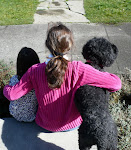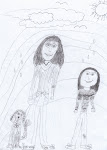My last post offered a description of one adult adoptee's struggles with family, with her sense of belonging, with identity. The film trailer for "Adopted" shows Jen trying to explain her struggles to her mother who, in the film, battles a terminal illness.
Jen's story is enough to keep any parent of a transracially adopted child awake at night. But, as difficult as it is to watch, "Adopted" heightened my awareness. As an adoptive parent to a child of a minority race, an essential part of my job is to acknowledge and address the challenges that come with being a mixed race family.
Thankfully, in my search to learn more, after viewing “Adopted,” I came across another video.
Judy and Aaron Stigger share a very different story -- one with a far happier outcome. This isn't to discount Jen Fero's story. But stories like Aaron Stigger's are also important. To make us smile. To help us further understand. To give us hope.
This 4 minute video was originally posted back in January 2009 by Adoption Learning Partners (ALP), an educational organization whose primary goal is to have a "positive measurable impact on adoption outcomes." ALP offers a variety of web-based courses for adoptive parents and professionals, but there's also a wealth of free information and other resources if you dig about on their site and check out their "Community" page.
I love the message in this video that mother and son, Judy and Aaron Stigger, have to offer. Perhaps just as important as the verbal message is the body language, the clear, easy affection you see between mother and son.
Judy Stigger, by the way, was one of ALP's founders (which officially makes me a fan.) Judy and Aaron also did an interview with NPR's Steve Inskeep, back in July 2007, sharing their experiences and insights on transracial adoption. There's a great summary write-up of the interview on the NPR website, or better still, you can listen to the interview, or read the transcript. (NPR has done a number of pieces on transracial adoptions and there are several terrific links on this site.)
In the on-air interview, Judy shares one of the ways she used to respond to the classically intrusive comments adoptive families so often encounter: "People would say, 'Do you have any real children?" She'd turn to her son, Aaron, and say, "No, I just have this plastic one." Aaron, playing along, would in turn hold out his arms and sing, "Ta-da!" Judy taught her son by example, defusing an otherwise potentially awkward moment with humor -- while also communicating the thoughtlessness of the question.
Aaron, also present for the interview, describes his memories of growing up, of not wanting to stick out, not wanting to be different, appreciating the opportunities he had to know, and make friends with other kids, other people, of color. This prompts Steve Inskeep to turn to Judy and ask how much thought she put into this. Judy credits a moment she experienced with her daughter (also adopted, also bi-racial):
"When she was about eight, we spread across the bed all the congratulations cards we'd gotten when we adopted her, because now she could read them. And then she looked at me and just got this pain wash across her face, and said, 'Mom, was I supposed to be white?' And I looked at the cards and realized every one of them had a little white baby face on it. And it struck me that this parenting business wasn't going to be about not being prejudiced. It was going to be about being inclusive."
In time, Judy began sending holiday cards to family and friends featuring people of color. One day, her daughter received an Easter card from Judy's mother. Her daughter took the card up to her room to read it in private -- but returned, flying down the stairs, holding the card out in front of her for her mother to see. The card showed a risen Christ, black, muscled, with dreadlocks. Judy's daughter said, "My grandma loves me!"
Further on in the interview Judy describes another moment of heightened awareness. She’d gone to attend one of Aaron's performances when he was part of a black theater group his freshman year in college. Walking into the theater, Judy realized she was one of the few white people in the audience. She realized how she stuck out, how exposed she felt -- and then she thought this is how her children must feel, as minorities, living, moving, and breathing in a predominantly white world. At this point, Aaron can't jump in fast enough. He explains, eagerly, emphatically, that this is an issue for all transracially adopted kids, for that matter, for all minorities. "Thank you! Thank you!" he exhales. "That right there needs to be on every program nation-wide!"
The message from both Judy and Aaron (and Jen as well) is that no child growing up likes or wants to stick out or be different. Children of color need friends, neighbors, and role models of color -- both in their immediate world and in the imagery, the media, that surround them. As caucasian parents with children of color, we need to support our children, to be as inclusive as we can. We can't limit ourselves to a world of white privilege.
As Judy puts it: "You need to see the world in color."
Wednesday, October 7, 2009
Subscribe to:
Post Comments (Atom)






2 comments:
This is such a great post, Lisa--I loved the clip, and you're so right that the body language between mother and so conveys the health of their relationship. Also the way they talk about racial issues together. Occasionally I think we're moving into a more enlightened world.
Hi Martha,
I would love to think and, in my heart of hearts, certainly hope we're moving toward an enlightened world. With Obama's election it really felt like the world tilted in that direction. But with the backlash and vitriol we've seen leveled against him, I sometimes wonder... I think we all have a part to play, speaking up in defense of a saner, more rational, more tolerant world.
Post a Comment